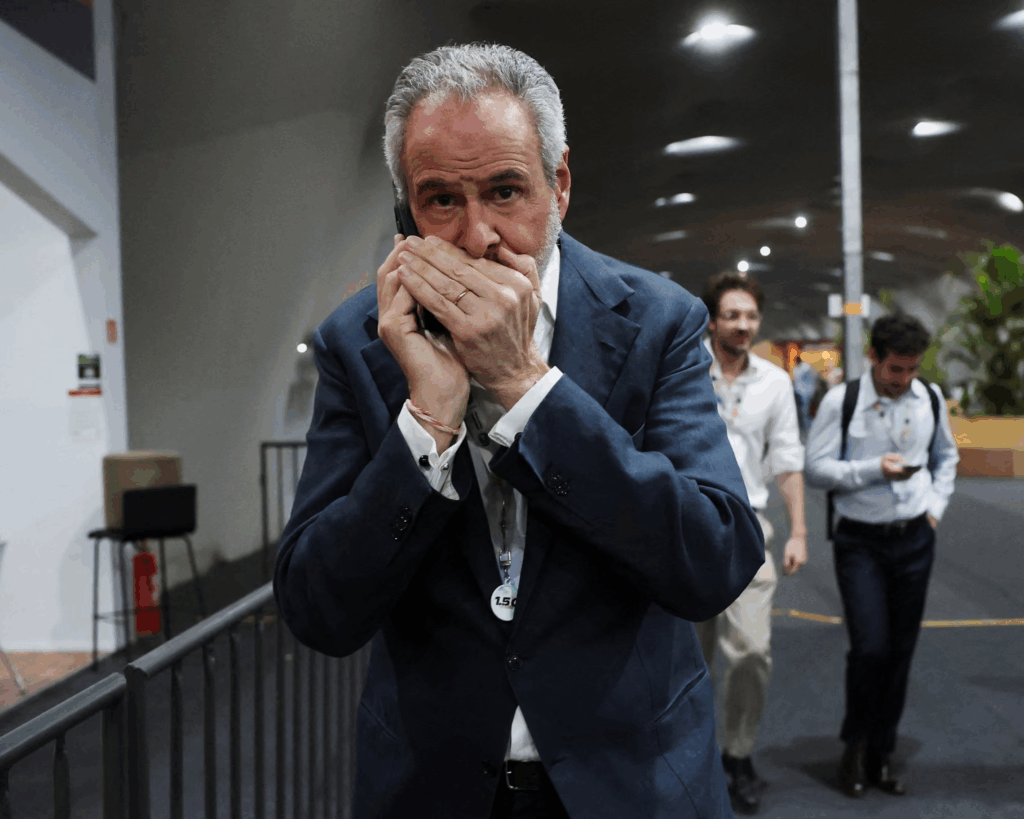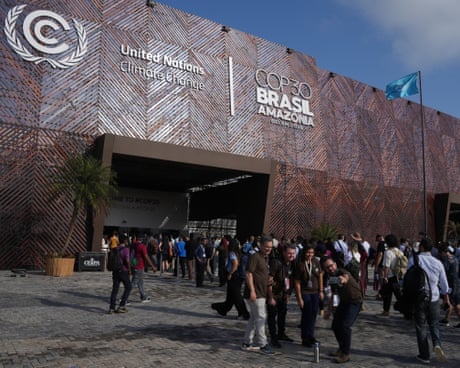The main purpose of this ongoing blog will be to track planetary extreme, or record temperatures related to climate change. Any reports I see of ETs will be listed below the main topic of the day. I’ll refer to extreme or record temperatures as ETs (not extraterrestrials).😜
Main Topic: End of Fossil Fuel Era Inches Closer Due to Cop30 Deal?
Dear Diary. At the end of every yearly Conference of the Parties meeting broad agreements are made with various countries making commitments to reduce fossil fuel emissions. And every year some countries renege from some promises, such as putting funds into an account to help the poorer global south to combat climate change. Sigh. Throughout human history treaties and agreements have been broken, especially those that can’t be enforced via military action, and if course there isn’t a global military police that will be able to Crack down on nefarious cheating governments.
It will be interesting to follow what happens after Brazil’s COP30. The Guardian does an excellent job reporting on climate items, and especially agreements coming out of the COPS. Here is their latest summary in final agreements coming out of COP30:
End of fossil fuel era inches closer as Cop30 deal agreed after bitter standoff
Wealthy countries agree to triple funds for countries to tackle climate impacts, but deforestation and critical minerals blocked from final deal

Cop30 president André Corrêa do Lago speaking on the phone shortly before the summit’s closing plenary. Photograph: Adriano Machado/Reuters
Fiona Harvey, Damian Carrington, Jonathan Watts and Damien Gayle
Sat 22 Nov 2025
The world edged a small step closer to the end of the fossil fuel era on Saturday, but not by nearly enough to stave off the ravages of climate breakdown.
Countries meeting in Brazil for two weeks could manage only a voluntary agreement to begin discussions on a roadmap to an eventual phase-out of fossil fuels, and they achieved this incremental progress only in the teeth of implacable opposition from oil-producing countries.
The talks were hauled back from the brink of collapse in an all-night session into Saturday morning, after a bitter standoff between a coalition of more than 80 developed and developing countries, and a group led by Saudi Arabia and its allies, and Russia.
There was disappointment from campaigners, but relief that the talks had produced at least some progress. Developing countries achieved part of their goal at the global talks, which was a tripling of the financial support available from rich countries to help them adapt to the impacts of the climate crisis. They should receive $120bn (£92bn) a year for adaptation, from the $300bn developed countries pledged to them last year, but not until 2035, instead of the 2030 deadline they were demanding. Many had also hoped the increase would be on top of the $300bn.
A roadmap to the halting of deforestation was dropped from the final deal, a bitter disappointment for nature advocates at this “rainforest Cop” held in Belém, near the mouth of the Amazon River.
The agreement among 194 countries – excluding the US, which did not send a delegation – was reached in the early morning after 12 hours of nonstop extra-time talks among ministers in deserted conference halls, and completed at a closing meeting at 1.35pm, after negotiations were hauled back from the brink of collapse on Friday evening.
Jennifer Morgan, the Cop veteran and former German climate envoy, said: “While far from what’s needed, the outcome in Belém is meaningful progress. The Paris agreement is working, the transition away from fossil fuels agreed in Dubai [at the Cop28 talks in 2023] is accelerating. Despite the efforts of major oil-producing states to slow down the green transition, multilateralism continues to support the interests of the whole world in tackling the climate crisis.”
Mohamed Adow, director of the Power Shift Africa thinktank, said: “With an increasingly fractured geopolitical backdrop, Cop30 gave us some baby steps in the right direction, but considering the scale of the climate crisis, it has failed to rise to the occasion. Despite calling themselves climate leaders, developed countries have betrayed vulnerable nations by failing to deliver science-aligned national emission reduction plans.”

Poor countries must be supported to cope with a crisis not of their making, said Ali Mohamed, special climate envoy for Kenya. “The 30th Cop [conference of the parties under the 1992 UN framework convention on climate change] has reaffirmed both the urgency of climate action, and the disproportionate risks faced by the most vulnerable. Kenya and Africa stand ready to lead in the transition to clean energy, but resilience and adaptation cannot remain afterthoughts for a continent responsible for less than 4% of global greenhouse gas emissions,” he said. “Developed countries must finally honour their finance commitments.”
Efforts to limit global heating to 1.5C above preindustrial levels, in line with the goals of the Paris agreement, were also addressed in the final text, but less robustly than vulnerable countries had hoped. Before the conference, countries were supposed to present new national plans on cutting emissions, but they fell short of the commitments needed to maintain the 1.5C limit, which has already been breached but which analysts say could be returned to.
Instead of censuring this failure, the conference agreed to set up an “accelerator” programme to address the shortfall in the nationally determined contributions (NDCs), which will report back at next year’s Cop, to be held in Turkey but presided over by Australia. The text exhorted countries to “full implementation of NDCs while striving to do better”.
The final deal also recognised the “just transition” that social justice campaigners have been calling for, which means helping workers affected by the move away from fossil fuels and towards clean energy. But key provisions on the exploitation of “critical minerals” – which has been accompanied by soaring human rights abuses in some countries – were blocked by China and Russia.
Insiders said the talks came close to foundering on Friday, after a hectic few weeks in Brazil that began with a summit of world leaders held by Brazil’s president, Luiz Inácio Lula da Silva, and attended by about 50 heads or deputy heads of state.
High-level ministers from Jamaica, Cuba and Mauritius all spoke there of the devastating impact of Hurricane Melissa. “We did not create this crisis, but we refuse to stand as victims,” said Matthew Samuda, Jamaica’s economic growth minister.”
The UN secretary general, António Guterres, warned of temperature rises that would “push ecosystems past irreversible tipping points, expose billions to unliveable conditions, and amplify threats to peace and security”.
But after the leaders left and Cop30 formally began on Monday 10 November, discussions among ministers and high-ranking officials degenerated into a bitter standoff. A fire near the delegation offices on Thursday afternoon, in which no one was seriously hurt, forced evacuation of the conference centre and disrupted negotiations at a crucial stage.
When they resumed late on Thursday evening, the rift was clear: more than 80 countries had declared in favour of including a commitment to “transition away from fossil fuels” in the final outcome, but scores of countries – led by the Arab group, which includes Saudi Arabia – lined up against it.

That opposition forced the relegation of the “transition away from fossil fuels” – that scientists say is essential to staving off the worst effects of climate breakdown – to a voluntary commitment rather than the legally binding decision many had hoped for.
Teresa Anderson, the global lead on climate justice at ActionAid International, said: “A lack of climate finance is throwing a spanner in the works of climate progress. Global south countries, [which] are already carrying the costs of the climate crisis they have not caused, desperately need support from rich countries if they are to take on any more commitments. Nowhere was this more stark than on the issue of fossil fuels, where specific text once again ended up unfunded and on the cutting-room floor.”
Carolina Pasquali, executive director of Greenpeace Brazil, said: “We must reflect on what was possible, and what is now missing: the roadmaps to end forest destruction, and fossil fuels, and an ongoing lack of finance. More than 80 countries supported a transition away from fossil fuels, but they were blocked from agreeing on this change by countries that refused to support this necessary and urgent step. More than 90 countries supported improved protection of forests. That too did not make it into the final agreement. Unfortunately, the text failed to deliver the scale of change needed.”
Here are some “ETs” recorded from around the planet the last couple of days, their consequences, and some extreme temperature outlooks, as well as any extreme precipitation reports:
Here is More Climate News from Saturday:
(As usual, this will be a fluid post in which more information gets added during the day as it crosses my radar, crediting all who have put it on-line. Items will be archived on this site for posterity. In most instances click on the pictures of each tweet to see each article. The most noteworthy items will be listed first.)